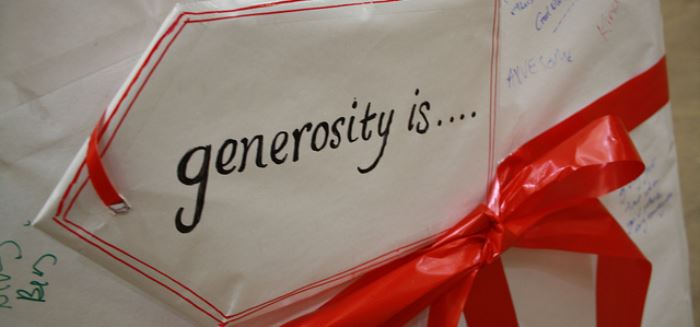A lot of stewardship books find their way to my desk and then, if I’m honest, to an ever-growing stack beside it. In this week’s newsletter, I reflect on one of those books that rose to the top, Contagious Generosity, which serves as a fine example of a particular aspect of stewardship teaching these days. Next week, we’ll hear from a pastor who helps to lead his congregation in generous living.
Yours truly,
Adam Copeland, Center for Stewardship Leaders
Generosity For You, Not From You
Adam Copeland
Two words often highlight stewardship teaching these days: generosity and culture. Indeed, it’s common to see these words used together in workshops, talks, and books that emphasize churches as cultures of generosity. I recently read Chris Willard and James E. Sheppard’s book, Contagious Generosity (Zondervan, 2012). Willard and Sheppard fully embrace this emphasis on culture and generosity. In fact, the first chapter is titled, “Culture is Key.”
“A church must be intentional about developing a culture of generosity from the outset,” they write, “because the culture of the church is the most powerful way of effecting corporate change.” Willard and Sheppard emphasize that culture is different than vision. Vision is important, for certain, but it describes a congregation’s desired future. Culture, on the other hand, is lived out in the actual day-to-day experience of a congregation. The authors explain they see a growing trend in congregations that embrace generosity as a core value.
They quote Brian Tome, senior pastor of Crossroad Church in Cincinnati, Ohio, who regretted his congregation’s slow embrace of a generosity culture: “By not talking about God’s perspective of money and possessions, we conditioned people to become consumers instead of givers.” For Tome’s congregation, a guiding principle about their financial future eventually became, “Spend it; don’t save it.” And, for their congregation, this has developed into a congregational culture that emphasizes intentionally spending their funds on the ways they discern God calling them to be a blessing to others.
Helpfully, Willard and Sheppard often use versions of the phrase they attribute to Andy Stanley, lead pastor at North Point Ministries in Atlanta: “Generosity is something we want for you, not from you.” I’ve run into other versions of this phrase in several places, and it sums up the culture and generosity movement succinctly.
When understood as a virtue, as a way-of-life and not simply an act, generosity becomes a personal and communal characteristic that can be developed and strengthened. Generosity is, after all, a fruit of the Spirit. If congregation leaders only speak of money (and other forms of generosity) when we hope to become recipients of gifts, we fail to indicate a culture of sharing, blessing others, and joining in God’s mission beyond the church’s walls. Instead, congregations that embrace a culture of giving help teach their members generosity because it’s a mark of discipleship, a fruit of the spirit, and not simply a way to increase the budget.
My guess is that Willard and Sheppard’s book, which mainly uses examples and quotes from large-church pastors and non-denominational congregations, might strike some readers of this newsletter as lacking appreciation for denominations or smaller congregations. Because of their point-of-view, however, I appreciated reading a book with a clear, direct emphasis on culture and generosity. After all, the good news of the gospel frees us from sin, for faithful, generous living.
FOR MORE INFORMATION
Stewardship Speaker Series: On August 18, the CSL invites you to campus for our last breakfast event of the summer. Pastor Drew G. I. Hart, author of Trouble I’ve Seen: Changing the Way the Church Views Racism, will be our speaker. For more information, and to register, visit www.luthersem.edu/stewlead.
Executive Certificate in Religious Fundraising: Luther Seminary, in partnership with the Lake Institute on Faith and Giving, is hosting a four-day intensive course, October 17-20, 2016. For more information visit:www.luthersem.edu/ECRF.

